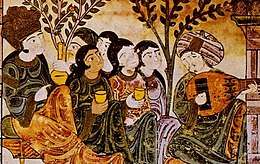Almeh

Almeh (Egyptian Arabic: عالمة ʕálma IPA: [ˈʕælmæ], plural ʕawālim عوالم [ʕæˈwæːlem, -lɪm], from Arabic: علم ʻālima "to know, be learned") was the name of a class of courtesans or female entertainers in Arab Egypt, women educated to sing and recite classical poetry and to discourse wittily, connected to the qayna slave singers of pre-Islamic Arabia.[1] They were educated girls of good social standing, trained in dancing, singing and poetry, present at festivals and entertainments, and hired as mourners at funerals.[2]
In the 19th century, almeh came to be used as a synonym of ghawazi, the erotic dancers of Dom ethnicity whose performances were banned in 1834 by Muhammad Ali of Egypt. As a result of the ban, the ghawazi dancers were forced to pretend that they were in fact awalim. Transliterated into French as almée, the term came to be synonymous with "belly dancer" in European Orientalism of the 19th century.
References
- ↑ Stavros Stavrou Karayanni (2004). Dancing Fear and Desire: Race, Sexuality, and Imperial Politics in Middle Eastern Dance. Wilfrid Laurier University Press. pp. 28–29. ISBN 978-0-88920-926-8.
- ↑

